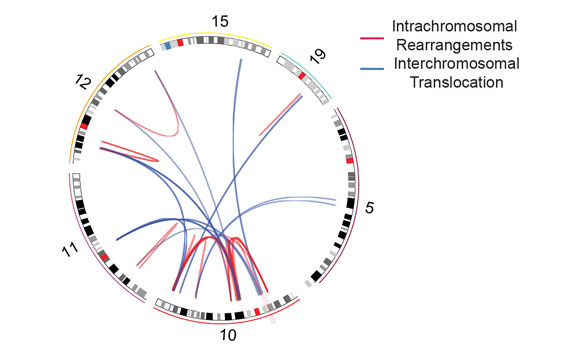
Yale University researchers find that a unique form of T cell lymphoma is distinguished by an unusually high number of gene deletions, setting it apart from other cancers.
A newly published study from Yale University shows that a deadly form of T cell lymphoma is caused by an unusually large number of gene deletions, making it distinct among cancers.
Researchers conducted a genomic analysis of normal and cancer cells from patients with cutaneous T-cell lymphoma, a cancer of T-cells of the immune system that normally reside in the skin.
Most cancers are driven by point mutations — or single DNA nucleotides that change the function of an encoded protein — rather than deletions that remove a segment of a chromosome. However, in this form of lymphoma, gene deletions that drive cancer pathogenesis outnumbered point mutations by more than 10 to 1, scientists report on July 20 in the journal Nature Genetics.
“This cancer has a very distinctive biology,” said Jaehyuk Choi, assistant professor of dermatology at Yale and lead author of the paper.
Many of the deletions occurred in genes that have been known to play a role in driving the proliferation of T-cells and are potential targets for new therapies, said Choi, a researcher with the Yale Cancer Center.
It is unclear why this cancer has such a high ratio of gene deletions compared to other cancers, said Richard Lifton, Sterling Professor of Genetics, chair of the Department of Genetics, investigator for the Howard Hughes Medical Institute, and senior author of the paper. He noted, however, that during early development DNA rearrangements can produce highly diverse T cell receptors, which enables them to recognize cells bearing viruses or other abnormal proteins. These lymphomas may arise from loss of the normal regulation of these genetic rearrangements, he explained.
Other Yale authors include Richard Edelson, Michael Girardi, and Francine Foss.
Funding for the work was provided by the Howard Hughes Medical Institute, the National Institutes of Health, and the Dermatology Foundation.
Reference: “Genomic landscape of cutaneous T cell lymphoma” by Jaehyuk Choi, Gerald Goh, Trent Walradt, Bok S Hong, Christopher G Bunick, Kan Chen, Robert D Bjornson, Yaakov Maman, Tiffany Wang, Jesse Tordoff, Kacie Carlson, John D Overton, Kristina J Liu, Julia M Lewis, Lesley Devine, Lisa Barbarotta, Francine M Foss, Antonio Subtil, Eric C Vonderheid, Richard L Edelson, David G Schatz, Titus J Boggon, Michael Girardi and Richard P Lifton, 20 July 2015, Nature Genetics.
DOI: 10.1038/ng.3356









Wonder if the deletions are caused by environment, such as UV exposure?